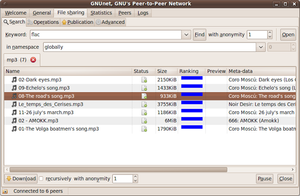GNUnet
 |
|

GNUnet with the GTK+ user interface
|
|
| Developer(s) | GNU Project |
|---|---|
| Initial release | November 5, 2001 |
| Stable release | 0.10.1 (April 8, 2014) |
| Repository | gnunet |
| Development status | Active |
| Written in | C |
| Operating system | Linux, FreeBSD, NetBSD, OpenBSD, OS X, Windows |
| Type | Anonymous P2P, Friend-to-friend |
| License | GNU General Public License |
| Alexa rank | |
| Website | gnunet |
GNUnet is a free software framework for decentralized, peer-to-peer networking and an official GNU package. The framework offers link encryption, peer discovery, resource allocation, communication over many transports (such as , , HTTP, HTTPS, WLAN and Bluetooth) and various basic peer-to-peer algorithms for routing, multicast and network size estimation.
GNUnet's basic network topology is that of a mesh network. GNUnet includes a distributed hash table (DHT) which is a randomized variant of Kademlia that can still efficiently route in small-world networks. GNUnet offers a "F2F topology" option for restricting connections to only the users' trusted friends. The users' friends' own friends (and so on) can then indirectly exchange files with the users' computer, never using its IP address directly.
GNUnet uses Uniform resource identifiers (not approved by IANA, although an application has been made). GNUnet URIs consist of two major parts: the module and the module specific identifier. A GNUnet URI is of form gnunet://module/identifier where module is the module name and identifier is a module specific string.
...
Wikipedia
